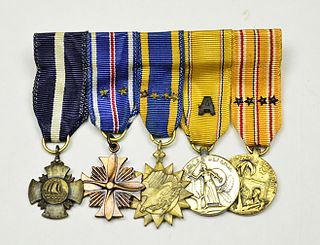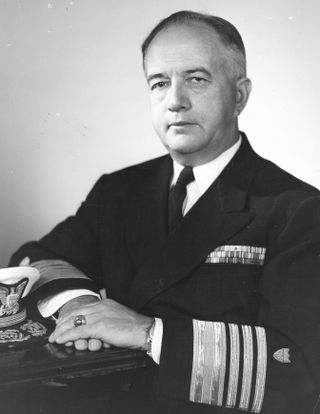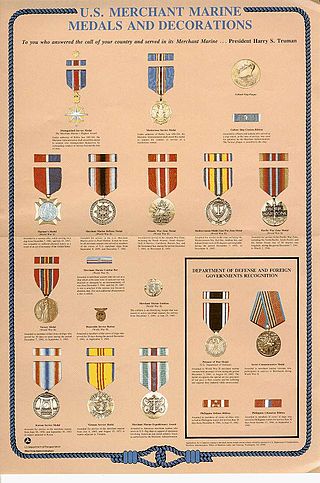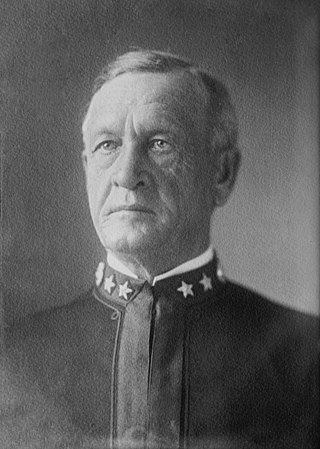
The Bronze Star Medal (BSM) is a United States Armed Forces decoration awarded to members of the United States Armed Forces for either heroic achievement, heroic service, meritorious achievement, or meritorious service in a combat zone.

The Northwest Passage (NWP) is the sea lane between the Atlantic and Pacific oceans through the Arctic Ocean, along the northern coast of North America via waterways through the Canadian Arctic Archipelago. The eastern route along the Arctic coasts of Norway and Siberia is accordingly called the Northeast Passage (NEP). The various islands of the archipelago are separated from one another and from Mainland Canada by a series of Arctic waterways collectively known as the Northwest Passages, Northwestern Passages or the Canadian Internal Waters.

The United States Coast Guard (USCG) is the maritime security, search and rescue, and law enforcement service branch of the United States Armed Forces and one of the country's eight uniformed services. The service is a maritime, military, multi-mission service unique among the United States military branches for having a maritime law enforcement mission with jurisdiction in both domestic and international waters and a federal regulatory agency mission as part of its duties. It is the largest coast guard in the world, rivaling the capabilities and size of most navies.

USCGC Healy (WAGB-20) is the United States' largest and most technologically advanced icebreaker as well as the US Coast Guard's largest vessel. She is classified as a medium icebreaker by the Coast Guard. She is homeported in Seattle, Washington, and was commissioned in 1999. On 6 September 2001 Healy visited the North Pole for the first time. The second visit occurred on 12 September 2005. On 5 September 2015, Healy became the first unaccompanied United States surface vessel to reach the North Pole, and Healy's fourth Pole visit happened on 30 September 2022.

The Chukchi Sea, sometimes referred to as the Chuuk Sea, Chukotsk Sea or the Sea of Chukotsk, is a marginal sea of the Arctic Ocean. It is bounded on the west by the Long Strait, off Wrangel Island, and in the east by Point Barrow, Alaska, beyond which lies the Beaufort Sea. The Bering Strait forms its southernmost limit and connects it to the Bering Sea and the Pacific Ocean. The principal port on the Chukchi Sea is Uelen in Russia. The International Date Line crosses the Chukchi Sea from northwest to southeast. It is displaced eastwards to avoid Wrangel Island as well as the Chukotka Autonomous Okrug on the Russian mainland.
The Antarctica Service Medal (ASM) was established by the United States Congress on July 7, 1960, under Public Law 600 of the 86th Congress. The medal was intended as a military award to replace several commemorative awards which had been issued for previous Antarctica expeditions from 1928 to 1941. With the creation of the Antarctica Service Medal, the following commemorative medals were declared obsolete;
The Navy Arctic Service Ribbon is a decoration of the United States Navy which was established in May 1986. The ribbon is authorized to any member of the U.S. Navy or United States Marine Corps for service above the Arctic Circle. Like the Antarctica Service Medal, it may also be awarded to civilians and members of other U.S. services.
A Sea Service Ribbon is an award of the United States Navy, U.S. Marine Corps, U.S. Coast Guard, the U.S. Army, and the NOAA Commissioned Officer Corps which recognizes those service members who have performed military duty while stationed on a United States Navy, Coast Guard, Army, or NOAA vessel at sea and/or members of the Navy, Marine Corps or Coast Guard who have been forward-deployed with their home unit.

The "A" Device is a miniature bronze 1⁄4 inch letter "A" which comes with and without serifs, that is authorized for wear by the United States Armed Forces as a medal and ribbon device for two military awards. It is added to overseas service ribbons to indicate the theatre of action.

The Global War on Terrorism Service Medal (GWOT-SM) is a military award of the United States Armed Forces which was created through Executive Order 13289 on 12 March 2003, by President George W. Bush. The medal recognizes those military service members who have supported operations to counter terrorism in the War on Terror from 11 September 2001, to a date yet to be determined.

Henry Asbjørn Larsen was a Norwegian-Canadian Arctic explorer. Larsen was born on a small island, Herføl, south of Fredrikstad in Norway. Like his hero, Roald Amundsen, he became a seaman. Larsen immigrated to Canada, and became a British subject in 1927. In 1928, he joined the Royal Canadian Mounted Police (RCMP).

Alfred Carroll Richmond was an admiral of the United States Coast Guard who served as the 11th Commandant of the United States Coast Guard from 1954 to 1962, the second longest tenure of any U.S. Coast Guard Commandant following Russell R. Waesche who served from 1936 to 1946.

Harry Gabriel Hamlet was the seventh Commandant of the United States Coast Guard, from 1932 to 1936.

Ellsworth Price Bertholf was a Congressional Gold Medal recipient who later served as the fourth Captain-Commandant of the United States Revenue Cutter Service and because of the change in the name of the agency in 1915, the fourth Commandant of the United States Coast Guard. His leadership during his tenure as Commandant was critical to the U.S. Coast Guard's survival at a time when outside agencies wanted to either take it over or split its missions up among several agencies.

Awards and decorations of the United States Merchant Marine are civilian decorations of the United States which are issued to the members of the United States Merchant Marine for a variety of duties both in peace and war. Originally authorized to be issued by the War Shipping Administration of the World War II era, these awards were later issued by the Maritime Commission and are currently issued by the Department of Transportation's Martitime Administration.

USS Bear was a dual steam-powered and sailing ship built with six-inch (15.2 cm)-thick sides which had a long life in various cold-water and ice-filled environments. She was a forerunner of modern icebreakers and had a diverse service life. According to the United States Coast Guard official website, Bear is described as "probably the most famous ship in the history of the Coast Guard."

The Defence Medal is a campaign medal instituted by the United Kingdom in May 1945, to be awarded to citizens of the British Commonwealth for both non-operational military and certain types of civilian war service during the Second World War.

Uriel Sebree was a career officer in the United States Navy. He entered the Naval Academy during the Civil War and served until 1910, retiring as a rear admiral. He is best remembered for his two expeditions into the Arctic and for serving as acting governor of American Samoa. He was also commander-in-chief of the Pacific Fleet.

David Scott Cowper is a British yachtsman, and was the first man to sail solo round the world in both directions and was also the first to successfully sail around the world via the Northwest Passage single-handed.

The Arctic Star is a military campaign medal instituted by the United Kingdom on 19 December 2012 for award to British Commonwealth forces who served on the Arctic Convoys north of the Arctic Circle, during the Second World War.

















